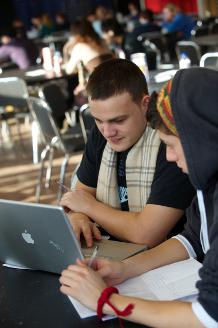Modern German language: contexts, trends and conflicts
Aims
Aims
This module aims to increase students’ awareness and understanding of the German language as it is used today in a variety of contexts by offering an opportunity to research one particular aspect of the foreign language in depth while getting intensive support along the way in regular seminars and project workshops.
The module will for instance look at the influence of foreign languages on Modern German (specifically English) or how changes in the language are viewed in German society and dealt with. Students will also look at the language as it is used in different media and contexts. For instance the language of advertising and the press will be analysed and students will look at Modern German as it is used in Youth Culture(s) or by different groups of immigrants. Language politics and issues of language learning will also be addressed and analysed.
By the end of the module students should:
- Be able to understand and recognize aspects of modern German
- Broaden their knowledge and skills in producing German in different social contexts
- Be able to show an increased awareness of register and a variety of linguistic styles
- Be able to research aspects of modern German and present material in oral and written form in advanced German
Prerequisites
Prerequisites
Students must have successfully completed:
- G06I German Language & Society II (LAN00006I)
Programme
Programme
This is an option module which can be taken additionally to the core module. The module counts as a Language module taught entirely in German.
This module deals with trends in the German language looking at language change and a variety of aspects of the language as it is used at the moment. Students will improve their language skills by researching aspects of Modern German using audio, video and text-based material.
Contact hours
Two hours per week:
- One seminar
- One hour of supervised project work
There will be a weekly one hour long seminar and one hour dedicated to project work, which will be a mixture of tutor-led classes and individual sessions with the tutor by appointment. Students will receive a list of topics to choose from, or they can work on a topic they have chosen and discussed with the tutor.
All the lessons are conducted as seminars in order to encourage discussion and interaction. Therefore, completing weekly tasks in preparation for class discussion is an essential part of students’ commitment.
Teaching materials
Course material will be supplied by the tutor.
Assessment and feedback
Assessment and feedback
Feedback on formative work
- Written formative work
- Written comments on the work
- Mark on University mark scale
- Oral/written feedback in class
- Class discussion on major issues and mistakes/content/structure
- Individual feedback during office hours, when necessary
- Oral formative work
- Feedback on oral presentations and class discussions
- Direct oral feedback in class discussions
- Written feedback form for oral presentations
- Mark on university marking scale
- Comments on different aspects of the presentation, i.e. content, argumentation, logic, register etc.
- Individual feedback during office hours, when necessary
Written feedback will usually be given within 2 weeks.
Summative assessment and feedback
- 3000-word written assignment (based on the project work) in German, due in Spring Term, Week 1.
- Weight: 100%
Feedback: written feedback form with a mark on the university marking scale, confirmed by the second marker, written comments on different aspects of the work, i.e. structure, content, logic and argumentation, grammatical accuracy, examples of typical mistakes (language).
Skills
Transferable skills developed in this module
All modules provide an opportunity to work on general oral/written communication skills (in class and in assessments) and general self management (organising your studies), alongside the specific skills in language or linguistics that the module teaches.
In addition, this module will allow you to particularly develop skills in application of data analysis skills: on this module you will chose a project topic, and develop a research plan and schedule for the work to be completed. Through regular group seminars and individual meetings you will develop your understanding of issues in the modern German language as it is used today. You will research various resources and materials and improve your data analysis skills culminating in a research paper and oral presentation of your findings.
Follow this link to hear how past students use transferable skills from their degree in their current jobs.

About this module
- Module name
Modern German language- Course code
G12H (LAN00012H)- Teacher
Nadine Saupe- Term(s) taught
Autumn- Credits
20
